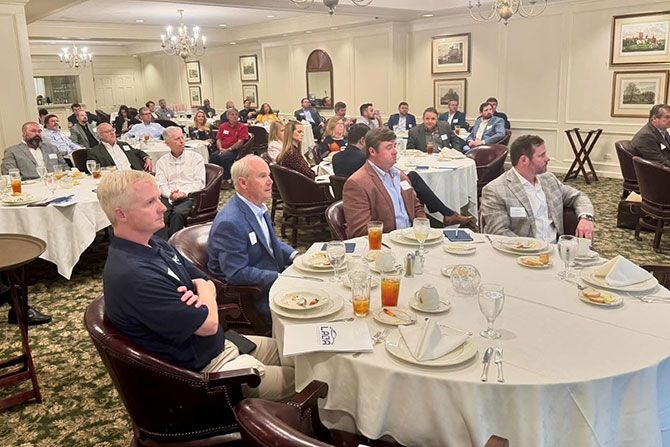As I reflect on this past year, I am filled with immense gratitude for the unwavering support, engagement and commitment of our dealer body. Serving as president and CEO of the Louisiana Automobile Dealers Association (LADA) has been a privilege. Working alongside such a dynamic group of leaders — dedicated not only to their own businesses but also to the success and future of our industry — has been inspiring. Your involvement has driven our progress, and together, we have achieved significant milestones critical to our shared success.
When I stepped into this role, I knew no two days would be the same, and 2024 has more than lived up to that expectation. Our industry is in a constant state of transformation, grappling with challenges on multiple fronts at both the state and national levels. From continued attacks on the franchise model and critical tax policy debates to mounting federal regulations, such as the Federal Trade Commission’s (FTC) Vehicle Shopping Rule and the Environmental Protection Agency’s (EPA) greenhouse gas emission standards, the stakes have never been higher. These challenges directly impact your businesses, but rest assured, LADA remains steadfast in its mission to advocate for policies that protect, empower and sustain dealerships through these complex and dynamic times.
State-Level Successes: Defending the Franchise Model
At the state level, LADA has been active. This year, Louisiana held three special sessions addressing redistricting, crime and tax reform, in addition to a regular legislative session. I’m proud to share that LADA secured a significant victory by defeating legislation that could have drastically altered the dealership landscape in our state. The proposed bill aimed to permit zero-emission vehicle manufacturers to bypass independent dealers and sell and service vehicles directly — a clear threat to the independent dealer model that has been the backbone of our communities for generations. Thanks to your unified efforts and strong advocacy, we successfully safeguarded against manufacturer-owned dealerships, with the bill failing in the House Transportation Committee.
However, the fight is far from over. The Volkswagen Group’s recent announcement that its wholly-owned Scout brand will bypass its U.S. dealers underscores the ongoing threat to the franchise model. For decades, Volkswagen and Audi dealers have been trusted partners, advocating for products aligned with American consumers’ needs. Instead of investing in its dealer network, Volkswagen AG chose to fund Scout’s development as a direct competitor. This highlights the critical importance of defending the franchise model.
The Value of the Franchise Model: Data-Driven Insights
This growing trend emphasizes the need for data-driven insights to showcase the undeniable advantages of the franchise model. A recent analysis by the globally respected consulting firm Oliver Wyman, commissioned by NADA, confirms that the dealer franchise system is the most efficient and cost-effective way for automakers to distribute and sell vehicles in the U.S.
Here’s how the net cost of distribution compares across different models:
- Traditional Franchise Model: $2,910-$3,240
- Hybrid Model (a mix of franchise and direct sales): $3,115-$3,585
- Direct Sales Model: $3,080-$3,350
The findings debunk claims from manufacturers that direct-to-consumer sales are a cheaper alternative. The study underscores what we’ve always known: Louisiana’s franchised dealerships provide exceptional value — not just to consumers, but to entire communities through job creation, tax revenue and charitable contributions.
The Tesla Lawsuit: Defending the Franchise System
In the legal arena, the Tesla lawsuit against LADA and the Louisiana Motor Vehicle Commission (LMVC) continues to pose a serious threat to the franchise model nationwide. While the United States Court of Appeals for the Fifth Circuit upheld the district court’s dismissal of Tesla’s equal-protection claim — a significant victory — it revived Tesla’s antitrust claim against LADA and due-process claim against the LMVC commissioners, sending these issues back to the district court. This litigation challenges dealer-manufacturer relationships, the Noerr-Pennington doctrine — which shields associations from antitrust liability for lobbying efforts — and regulatory bodies where market participants serve, calling into question their constitutional legitimacy on a national scale. LADA remains committed to defending the franchise model and advocating for your interests in this ongoing battle.
Tax Reform: Critical Amendments Secured
On the tax reform front, we navigated one of the most significant challenges of the year: the administration’s original proposal to repeal the inventory tax credit without eliminating the inventory tax itself. Such a move would have been devastating to small businesses across Louisiana, including dealerships. Through our collaborative efforts with Governor Landry, Secretary of Revenue Richard Nelson and key legislators, we emphasized the critical importance of retaining the inventory tax credit to support small businesses — especially dealerships that manage substantial inventory while operating on narrow margins. This advocacy helped secure critical amendments that ensure pass-through entities — such as LLCs, S-corporations and partnerships — retain the inventory tax credit indefinitely, while C-corporations will benefit from the credit, which sunsets in July 2026. Although the ultimate goal remains the complete elimination of inventory taxes, these amendments offer critical protections and stability in the meantime.
Additionally, new legislation lays the groundwork for parishes to explore phasing out inventory taxes entirely, paving the way for a more equitable and competitive tax environment. The governor’s plan also includes several changes aimed at improving Louisiana’s tax landscape. The plan includes eliminating the corporate franchise tax and reducing the corporate income tax rate from 7.5% to 5.5%, which is a significant step forward for businesses. For individuals, the plan simplifies the personal income tax system by introducing a flat 3% rate instead of the current three-tiered brackets and increases the standard deduction.
Federal Policy
At the federal level, we are optimistic that the incoming Trump administration will prioritize many of the critical issues facing the automotive industry, including FTC’s Vehicle Shopping Rule and the EPA’s greenhouse gas emission standards. His historic victory over the Harris-Waltz ticket — not only securing the electoral college but also the popular vote, a first for a Republican since 2004 — signals a mandate for change. It is our hope that the administration will begin addressing the burdensome regulatory environment impacting our industry as early as Jan. 20, 2025.
The Road Ahead
Looking ahead to 2025, we know new challenges will arise, including continued Tesla litigation and further tax reform measures during the fiscal session in April. We are also closely monitoring issues with legacy manufacturers and working to address your concerns. Rest assured, LADA is here for you — fighting every step of the way in Baton Rouge, Washington and the courtroom — to ensure your businesses remain protected and prosperous.
Thank you for your continued support of LADA and your dedication to our industry. Together, we have accomplished so much in 2024, and I look forward to all we will achieve in the year ahead.









